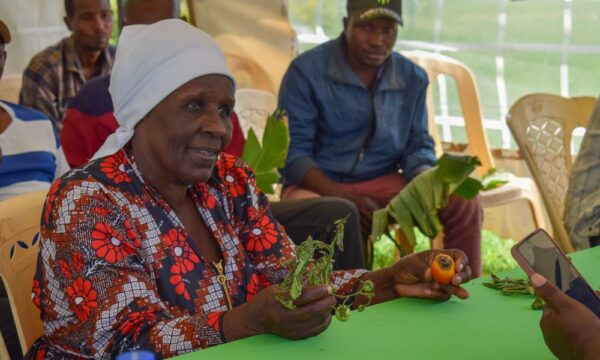They are young and sophisticated technophiles operating in the fast lane of life. A typical day for them entails spending considerable amounts of time on the cyberspace. Additionally, they are innovative and have a proclivity for taking greater entrepreneurial risks. Meet the burgeoning youth population that is revolutionizing the agricultural landscape in Kenya.
After years of playing second fiddle to the older generation, the young farmers are transforming the perception of farming, long entrenched in the nation’s psyche. To most Kenyans, farming was a back-breaking, hardly remunerative, labour-intensive task. However, the young farmers are challenging that notion and causing a paradigm shift to one that regards farming as a profitable venture. As a consequence, many now view agriculture, not as a last resort source of income but as a potentially rewarding enterprise.
Unlike the conventional farmers, the young farmers are not interested in cultivating the traditional crops or rearing the typical domestic animals. Their farming philosophy is simple: grow short cycle crops that have quick returns and focus on intensive agriculture. To these young farmers, farming is trendy, and notwithstanding their impressive academic qualifications, they are very much at home soiling their hands to eke out a living where their less imaginative peers see no opportunities.
To appreciate the significance of the uptake of agriculture by the youth in Kenya, one would need to glance through the Kenya Economic Report 2013. According to the report, creation of jobs for the youth has been identified as a major focus of the country’s development policy. The report states that in Kenya, the youth constitute the bulk of the population. A challenge posed by this, however, is the country’s economy has not created adequate modern jobs for these youths. This is according to a World Bank report that further states that, as a result of the aforementioned, poverty levels are still high and a good number of the youth are being steamrolled into low-paying jobs in the informal sector and subsistence agriculture.
The primacy of agriculture in Kenya’s economy cannot be overstated. The agricultural sector directly accounts for 26 percent of the country’s Gross Domestic Product (GDP) and 27 percent indirectly through associations with manufacturing, distribution and other service-related sectors. In addition, agriculture contributes immensely to rural employment, food production and rural incomes.
In view of the foregoing, it is welcome news, indeed, to see young Kenyans taking charge of their destiny and plunging into the erstwhile miasmic jungle that was agriculture. It is even more heartening to see players, both in the public and private sector join the bandwagon and support the youth in their quest.
Currently, the government of Kenya through one of its state corporations, the Youth Enterprise Development Fund (YEDF) is offering the “Agri-Vijana” loan. The loan targets young people keen on undertaking agribusiness and more precisely, greenhouse farming. The loan package entails supporting young farmers in acquiring greenhouses and global compliant agricultural inputs. This conforms perfectly with the World Bank’s recommendation on poverty eradication. The Bretton Woods’ institution has identified increasing productivity of smallholder farmers through the use of fertilizer, improved seeds and access to markets as a critical pillar in the short and medium-term poverty reduction strategy.

Plant doctor Lucy Karimi (Right) demonstrates to MaryLucy the Plantwise Factsheets Library application installed on her tablet (Photo by Willis Ochilo, CABI)
Remember, these young farmers are technophiles. They have smart phones and are active on social media. It is with this realization that organizations such as Mkulima Young, IICD, Hivisasa, Plantwise etc are reaching out to them. The Facebook account for Mkulima Young, for instance, has more than thirty-one thousand followers. IICD is involved in the training of farmers in the use of text and voice messages to receive crop production information and market price information via their mobile phones. Plantwise, on the other hand, is trialling a mobile application christened Plantwise Factsheets Library. This application accords plant doctors, extension workers and farmers free access to a full range of relevant plant health resource materials.
As it has been noted by IICD, in order to ensure the future viability of the agricultural sector, tackle rural poverty and generate employment opportunities in Kenya, it is of paramount importance to furnish these young farmers with the right tools. Besides equipping them, fostering their involvement in agricultural activities and decision-making processes should be prioritised. Efforts towards this end will further be amplified when synergies between Information and Communications Technology (ICT) and capacity development are encouraged. The young farmers have not only shown a knack to innovate but have a strong affinity for using ICT. ICT, therefore, could potentially play a major role in countering youth migration to urban areas by enhancing access to market information, production techniques, new technologies and financing opportunities.
19 Comments
Leave a Reply
Related News & Blogs
Biocontrol that goes the distance: Acerophagus papayae in Kenya
Acerophagus papayae can slow the spread of the invasive papaya mealybug and benefit the wider community. Recent monitoring efforts have shown that the natural enemy is reaching long distances away from the original release sites. Papaya mealybug attack…
20 May 2025






I’ve met the guy who started Mkulima young! Very cool
Access to information (market, technology etc) has been a major hindrance to agricultural production. ICT has the potential to revolutionize agriculture.
I totally agree with you.
the best way for the youth to contribute to the national cake and also improve on food security.
the best way for the youth to contribute to the national cake and contribute to food security.
The young farmers are taking a nice lead in shaping the future of agriculture in Kenya,…quite commendable of them.
Over the years, Agriculture was seen as the backbone of the kenya’s economy. Sometime back, young people were relaxed on farming and rushed 4 white collar jobs. With the new systems and technology,agribusiness could be the way to get out of the current problem of food insecurity and joblessness.
With the right focus, the young farmers have an opportunity, to not only change the agricultural outlook in Kenya, but to shape the destiny of the nation….they definitely need to be cheered on.
For us to achieve food security and create employment for the youth, this is the way to go. Youth be encouraged and forge forward now that there is youth fund and access to loans through MSEs & Banks.We are in the right track. Keep up!
I absolutely agree with you,
Willis, your findings n research is correct.However, players in the tourism sector should help youth to exploit ecotourism in addition to agriculture, to improve their economic status
Thanks Daniel, definitely worth exploring.
Agriculture is the foundation of any nation.
we should agree how youth farmers contribute a lot of improvement when it comes to farming. I couldn’t agree more how they perform well in terms of boosting and maximizing productions and create a sustaining agriculture. In terms of technological operations, they wont fear it as they can learn much better. Youths did a great job to this matters. Kudos!
[…] refutes the suggestion that it might be hard to attract people to her incubation centres. She cites examples from Kenyawhere young people are returning to rural areas after their dreams of success in the city fail and […]
Very encouraging developments and paradigm shift. I am interested in understanding the capacity and capability development gaps.
The world is changing very much and youth won’t be youthful forever.
There is need to adopt better ways of farming to realize food security.
Techniques like hydroponic fodder being promoted by Dutch NGO http://www.hydroponicskenya.org should be encouraged by local government.
Thanks for posting this. Really like the way you have set the focus on the youth and upcoming young farmers. Thank you for the post.
And the trend continues, I’m impressed by the number of youth continuously going the agriculture route.